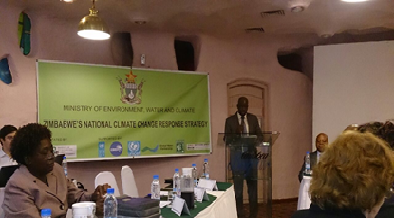The Government of Zimbabwe through the Ministry of Environment, Water and Climate contracted the Institute of Environmental Studies (IES) to facilitate the development of the Response Strategy. This was necessitated by the realisation of the adverse effects of climate change on Zimbabwe’s economy which is primarily agro-based with over 70 per cent of the population living in rural areas and reliant on climate-sensitive livelihoods such as arable farming and livestock.
In light of this, Global Water Partnership Southern Africa (GWP SA)’s continued participation in the process has supported the operationalisation of the Water, Climate and Development Programme (WACDEP) Work Package 2: on supporting National Developments and Sector Plans. Speaking at the workshop, GWP SA’s Executive Director, Ms Ruth Beukman highlighted how GWP SA believes in stakeholder engagement, supporting and enriching government decision making processes and programmes and this also includes commitment at local level with Catchment Councils and Sub Catchment Councils on water issues and the communities. She further reiterated GWP SA’s commitment to support the investment planning processes in particular looking for ways of working with the key stakeholders and the Ministry on prioritising the key initiatives especially in the water sector and other sectors that deal with development. Other supporting partner organisations present that is COMESA, UNICEF, UNDP, RESILIM and ENVIRONMENT AFRICA also expressed their willingness to support the Government in rolling out of the strategy.
In mapping the way forward Mr, P. Mupazviriho, Secretary for Environment, Water and Climate highlighted that the aim of validating the strategy was to work towards coming up with a climate change Policy and also to ensure the need as a nation to effectively and efficiently implement the strategies contained in the document. Feedback from the participants highlighted the need to develop a Policy that speaks to other Policies and in order to successfully implement the action plans, it was noted that the execution of the strategy should consider implementing small projects in the beginning and later as resources are mobilised implement big project. For that to be achieved it was pointed out that there was a need for the document to be disseminated to the local authorities for local implementation or include it as part of local programming at limited costs. The National Economic Consultative Forum (NECF) that ensures there is national consensus in projects like these, pledged support in the dissemination and also in ensuring the availability of stakeholder consensus throughout the implementation of the strategy. Additionally, it was pointed out that the document can also be translated into local vernacular languages and made available electronically. The need to have a central or national body to respond to call for proposals and develop proposals in order to help implement the strategy was also raised.
It is hoped that the NCCRS which has been a product of effective national dialogue and consultations will help improve water security and also promote climate adaptation in order to aid economic growth and human security.
